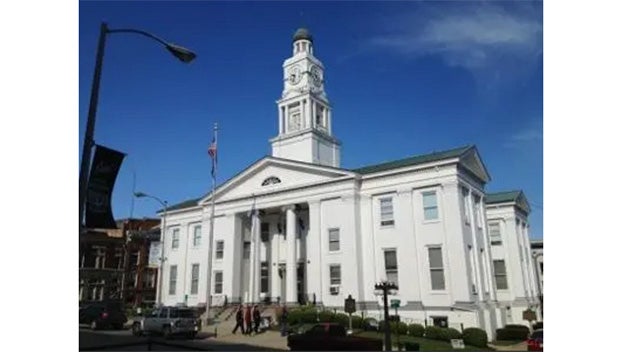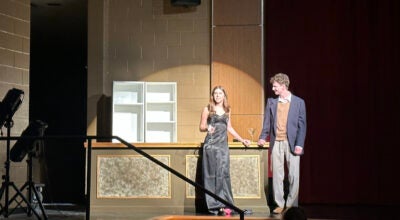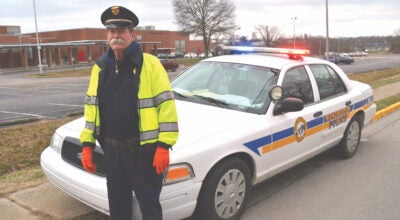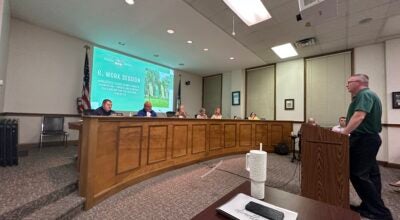Racial harmony resolution plaque dedicated at courthouse
Published 2:09 pm Tuesday, February 21, 2023
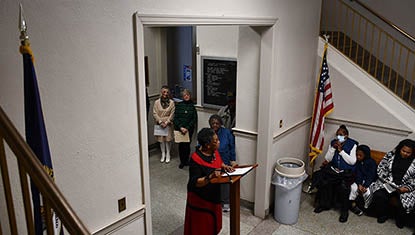
- Joyce Morton, founder of Winchester Black History and Heritage Committee, speaks at the Resolution on Racial Harmony Dedication Services on Thursday evening. (Photo by Matt Cizek)
|
Getting your Trinity Audio player ready...
|
When scheduling conflicts occur, many individuals might feel discouraged from participating in an event.
However, Thursday’s planned ceremony at the Clark County Courthouse would not be denied.
In the hallway area, dozens of community members gathered to participate in the Resolution on Racial Harmony dedication service.
“We are delighted to see everyone who has come out to share this historic living history,” said Jacquetta Hudson, the president of the Winchester Black History and Heritage Committee.
The dedication service took place after the historical events of this past summer.
Approved by the Winchester City Commission on June 21st of last year and by the Clark County Fiscal Court on July 28th, the plaque for Resolution on Racial Harmony has been placed outside the Clark County Courthouse steps.
The plaque does acknowledge some unfavorable moments in Winchester’s history, including slavery and outbreaks of violence.
However, it also recognizes an ongoing commitment to the principles that all people are created equal, progress toward racial equality has been made, and continued opposition to all forms of racial discrimination will be honored.
Winchester Mayor JoEllen Reed opened the ceremony and quoted Dr. Martin Luther King Jr.
“He said, ‘the time is always right to do what is right,’ and now is the time to do what’s right,” Reed said. “It’s the time to show our love and respect for each other in what we do and in what we say. This is our community.”
Following a rendition of “Lift Every Voice and Sing” by Vanessa Mason and an opening prayer from Pastor Marvin O. King of First Baptist Church, a spoken word poem titled “Love Your Neighbor” by University of Kentucky student Chelsea Coffey was read aloud.
Coffey talked about the need to unite despite political, social, or other causes that might threaten to create disharmony.
“Something in me really believes that we all make this harder than it is supposed to be,” she said. “Maybe all this was precisely what [Jesus] expected when he created humankind and saw all our differences, and yet he put no exception on the greatest commandment; [to] love your neighbor as yourself.”
After Coffey’s poem, Rhonda Blythe and Perri Wilson joined together to sing “Let It Start With Me”, with those in attendance joining in on the chorus.
Winchester resident Joyce Morton, who founded the Winchester Black History and Heritage Committee, served as the speaker.
Among other points, she mentioned that February 16 was chosen because it was when Frederick Douglass was elected President of the Freedman Bank and Trust in 1857. Douglass spoke in Winchester 19 years later at the Allen Chapel CME Church.
“Winchester is one city that has elected to connect today’s historical moment to plan meaningful changes in the way we experience and understand our shared history and culture,” Morton said.
After detailing much community history, Morton noted that – though pains have occurred – it was possible to create change with events such as the resolution on racial harmony.
However, action is also to be required.
“The promissory note has been signed by our elected officials. Let this joint resolution move us to be ambassadors for unity,” Morton said. “The plot is historic in that Clark County is one of the first cities to enact such a pledge. It is with good company.”
Before a closing prayer by Pastor Jerry Johns of First Christian Church took place and dinner was provided, members of the steering committee and those involved in the signing were acknowledged.
Speaking were both former Clark County Judge-Executive Henry Branham and former Magistrate Greg Elkins.
“I’ve been told, and I firmly believe that if we listen real closely, we can learn from our past,” said Branham. “So many times it’s hard for us to listen closely, but we can work to try to recognize it, interpret it, and make amends.”
Elkins reflected that much has been done, but much remains to be done as well.
“We have to continue the conversation. Don’t ever stop having the conversation,” said Elkins. “Hopefully, the conversation is different and becomes ‘remember when’ or ‘there was a time’…We’re not there yet. We’ve come a long way, but we sure have a long way to go.”
In closing, Johns offered some final thoughts in prayer.
“Instill the power of change in us so that we can work hand in hand to ensure justice and liberty for all,” he said. “Empower us until we are actively engaged in works of love that bring equity to the place we have broken and left broken.


